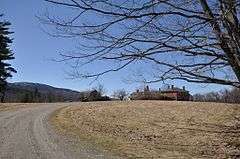Eli Morse Farm
|
Eli Morse Farm | |
 | |
| Location | Lake Rd., Dublin, New Hampshire |
|---|---|
| Area | 226.5 acres (91.7 ha) |
| Built | 1765 |
| Architectural style | Federal |
| NRHP Reference # | 83001135[1] |
| Added to NRHP | April 11, 1983 |
The Eli Morse Farm is a historic farm on Lake Road in Dublin, New Hampshire. It is one of the earliest settlements in the town, settled by Eli Morse in 1764. Morse served as a clerk of the community and left an invaluable record of Dublin's early history. The main house of his 225-acre (91 ha) farm is a large Federal style brick structure built c. 1822 by Eli Morse's son Thaddeus. Additions were made to the house in 1886, including a porch and front portico. The farmstead includes several outbuildings, including a barn, grist mill, and several cottages.[2]
The farm is also notable as the summer estate of New York City lawyer and diplomat Grenville Clark, who acquired the property through his wife's family in 1914. Clark organized a peace conference in 1945, held at this site, at which attendees drafted the Dublin Declaration, calling for the United Nations to be created as a world government. The Clark family continues to own the property, maintaining for agricultural and conservation purposes.[2]
The farm was listed on the National Register of Historic Places in 1983.[1]
See also
- Eli Morse Sawmill Foundations
- National Register of Historic Places listings in Cheshire County, New Hampshire
References
- 1 2 National Park Service (2010-07-09). "National Register Information System". National Register of Historic Places. National Park Service.
- 1 2 "NRHP nomination for Eli Morse Farm" (PDF). National Park Service. Retrieved 2014-04-24.
